Lebanon
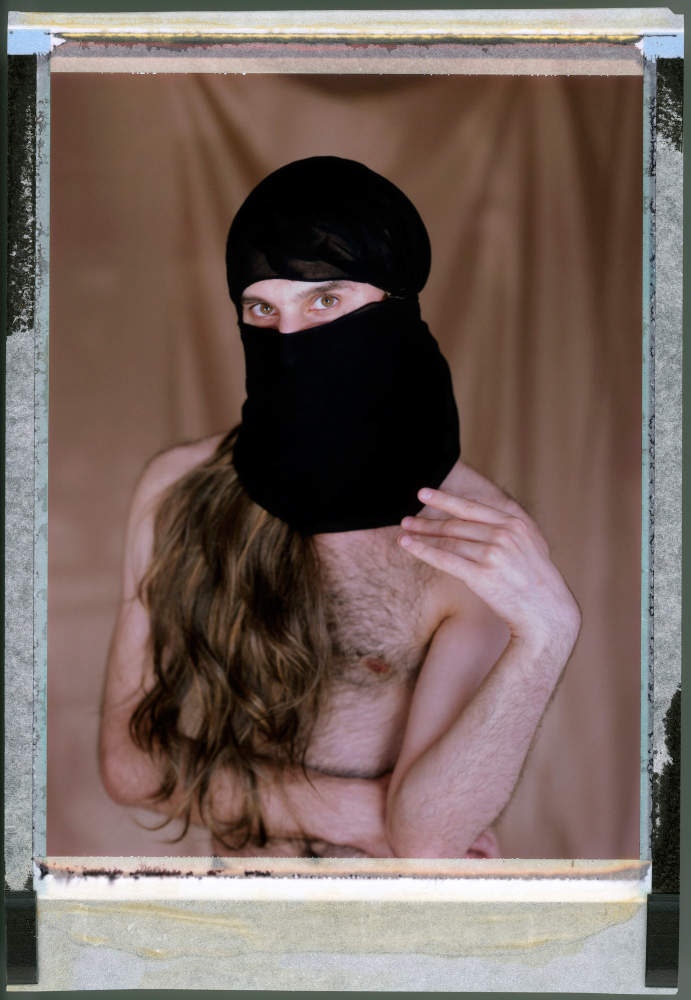
Sally
Sally has been in Lebanon for seven months. “I ran away from Syria because I was running away from ISIS. One of my family members is now with ISIS. Because of him I ran away here. He was in charge of investigations in ISIS. They want to catch and kill the gays. My last partner was kidnapped and interrogated by ISIS. I’m 90 percent sure they killed him. To kill someone they will choose the highest building and push him from it. They are worse than the Syrian investigation services. The gay people are treated as if they have a contagious disease. In Islam you are given the chance to ask for mercy and to re-enter Islam and follow the Islamic law. But ISIS consider gays as a contagious disease, so that’s why they kill them.”
Sally says her friend will be forced to name all the LGBT people he knows, including Sally. Then they will be hunted done. “Some of my other gay friends were captured and stoned to death, one pushed from the roof of a building, one was shot in the head – because of their sexuality. They had no proof – in Islam they say you have to have three witnesses, and caught in action, but they didn’t have any, they just killed them because they knew they were gay. I can never go back to Syria, the door of my parents and my country has been shut in my face. If I went back, they would kill me. The regime will take me directly to military service where I will die. ISIS will execute me – they will throw me from a building. Before they would shoot them. Now they push everyone from the buildings.”
Discussing his identity Sally says: “On the inside I’m a woman, from the outside – I don’t know maybe half/half … I’m a woman and not a man, I don’t even consider myself a gay person, what can I do. I’m planning to do my sex transition.” Sally has a short-term job teaching literacy to refugees to survive as well as receiving some support from NGOs. She is waiting for resettlement.
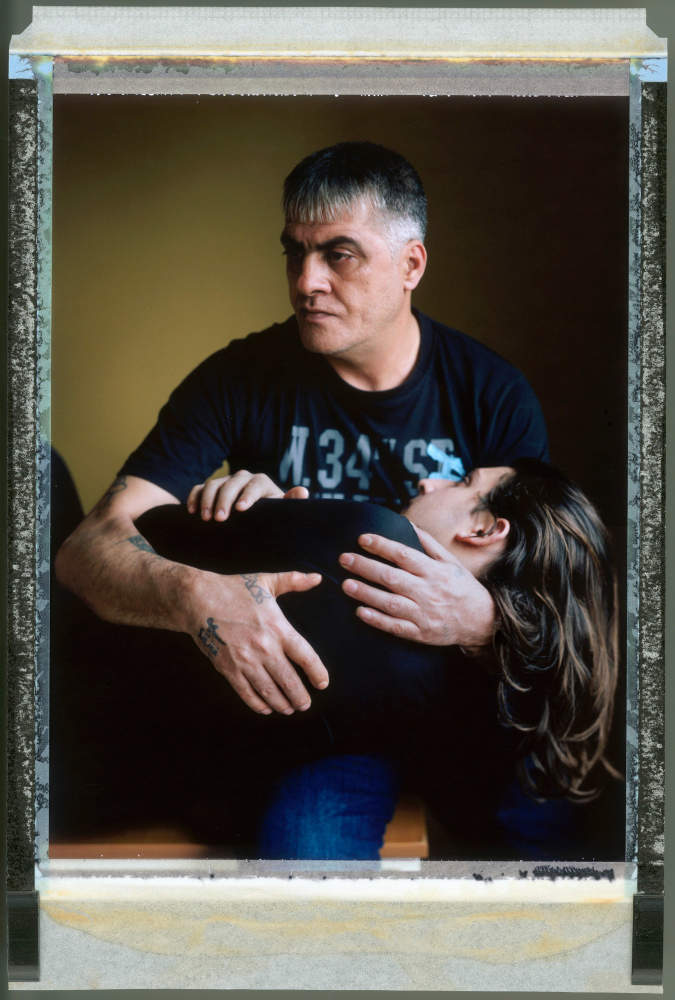
Abou El Kheir & Sari
45 year old Abou El Kheir, with his partner, 20 year old Sari. Sari, from the Syrian city of Hammmah, says “I was living with my grandparents until I was seven then I went to live with my father who had remarried. One night, when I was 10, it was a summers night, I woke up to find my father raping me. He raped me ten times over the course of a couple of years. My step-mother saw me once being raped. I didn’t say anything, but still my father turned on me and started to hate me, he beat me, and called me bad names, he treated me like I was a maid. I stayed until I was 15, and then I went back to my grandparents’ place. All my family was against me. I was living under the mask, because I didn’t want them to know I was gay. All my family treated me badly. My last three years in Syria were terrible because the war started. It didn’t affect my life directly, I was an hour from the fighting, but it affected me emotionally. And we were afraid because everyday we would hear rumours that the war would come to the city.”
Sari moved to Beirut – “I lived with my mother for three months” – but he was thrown out by her husband. “I met an old man. I spent a month and half at his house, it was very bad conditions.” He was helped to find a new place for himself where he spent six months. He worked for part of that time but he faced a lot of difficult times. ‘I was gaining gay features, more and more. People started making fun of me… My cousin once asked me ‘why are you very feminine – later on, you’ll get fucked!’ He was 25 and I was about 12. I felt bad when I heard these words. And even my step-mum, if I was wearing trousers that where a bit low, used to say to me ‘where are you going, to get fucked?”
“I felt like everyone was against me, I was scared that they would find out my sexuality and I would be killed immediately. I had no idea what was gay and what was straight but I had this feeling I was different, I knew I was attracted to men when I was young.” “I first knew the term ‘Gay’ when I met Abu El Kheir. In that moment, I had a good feeling, that I’m not alone and that there are a lot of people who are gay…. When I was in Syria I had short hair, when I came to Lebanon I grew my hair long. Now I am afraid that if my uncles on my mother’s side find out I am gay, I’m afraid they will kill me. I told my mother and my grandmother that I am gay so that I can travel, to be resettled…. I will never go back to Syria. No way! First, because I found the love of my life here, and the people I really want to be with. But I can’t go back to Syria. I would be in danger from the regime, from ISIS, from my family. And no one will accept me like I am now. To be Gay in Syria is not at all acceptable.” His partner, 45 year old Abou El Kheir, is from Damascus. He is divorced with three children who are in Syria with his ex-wife. Talking about his life back in Syria Abou El Kheir says “I was attracted to men more than women. I got forced to get married, to cover up I was gay when I was young. Whenever I saw a man I would say ‘I want this man’. I had these secret encounters with men while I was married.”
In 2002 his life changed for the worse: “My youngest son needed surgery, but I didn’t have money. My friend sent me to a place to get the money. I collected a bag a drugs and in return I got the money to do the surgery. I was obliged to do it. But while I was doing that I got arrested. I spent 11 years in prison from 2002 to 2013 – and I couldn’t do the surgery for my child. My son died. My wife divorced me while I was in prison.”
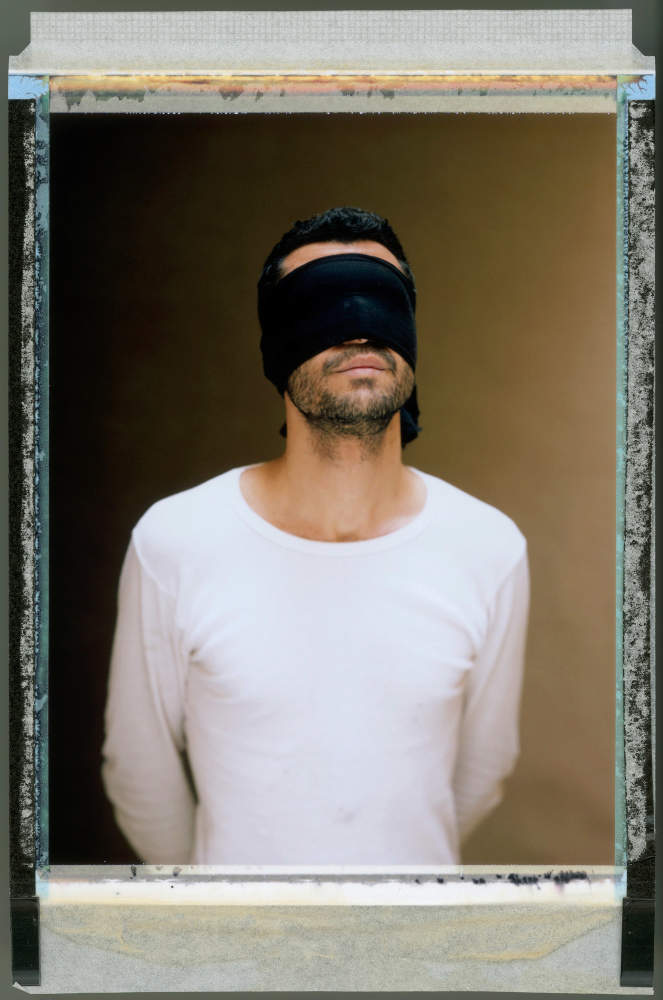
Wolfheart
29 year old Wolfheart [not his real name] from Beirut. In July 2011 he was arrested: “I was in a cruising area in Beirut. I was with my partner, in my car, driving around, meeting new people of course. I started chatting with someone in a car coming in the opposite direction. We were talking when a green car with tinted windows stopped behind us. The car in which the person I was talking to drove off quickly. Before I knew it I had the barrel of a Kalashnikov against my head and I was ordered out of the car. My partner tried to escape, but he was caught. One of them was wearing a military uniform. They shouted at me to put my hands behind my back, they handcuffed me to my partner and blindfolded us. We were taken up to the police office and they starting searching us. We had to take off our pants and drop our underpants. We were made to squat to see if we were hiding anything. One of the three officers in the room took out his mobile phone and started to take pictures while the others would take turns making fun of us, making signs behind us, and the other would slap us.
They took my partner to another room. Then I started hearing my partner screaming next door. They were torturing him. I felt sad, we had been together for six years, it was horrible to think of him in that situation. They found gay porn (on my phone). When they found that I started to feel scared. They didn’t stop insulting us. They would ask us questions like ‘do you like to get fucked?!’ If we didn’t answer they would slap us.”
For three days they were tortured and questioned. They were then taken from the military department to the police department. They were placed in a small airless room. “I felt like I was suffocating there.” They stayed there for 12 days. They were then sent to the police office specialised in investigating moral issues. “We were there for 18 days sharing a small cell with, at one time, 22 others.”
The interrogation continued. “They asked us many questions about my sexuality. They continued to beat my partner. I could sometimes hear him screaming.” After 18 days they were taken to court. There they waited seven days for trial. “We were being charged with homosexuality.” They were given a prison sentence of 45 days and a fine of USD 200. ‘I was very happy to leave prison. But I was unhappy because the news had reached my partner’s family and they were really unhappy. We had to break up.” “Six months later I drove through the same area and saw the same guys doing the same thing, holding a gun to the head of some people in a car and arresting them. I felt angry, I would like to see their own children subjected to this treatment! I felt angry but powerless and that at anytime I might receive the same treatment.”
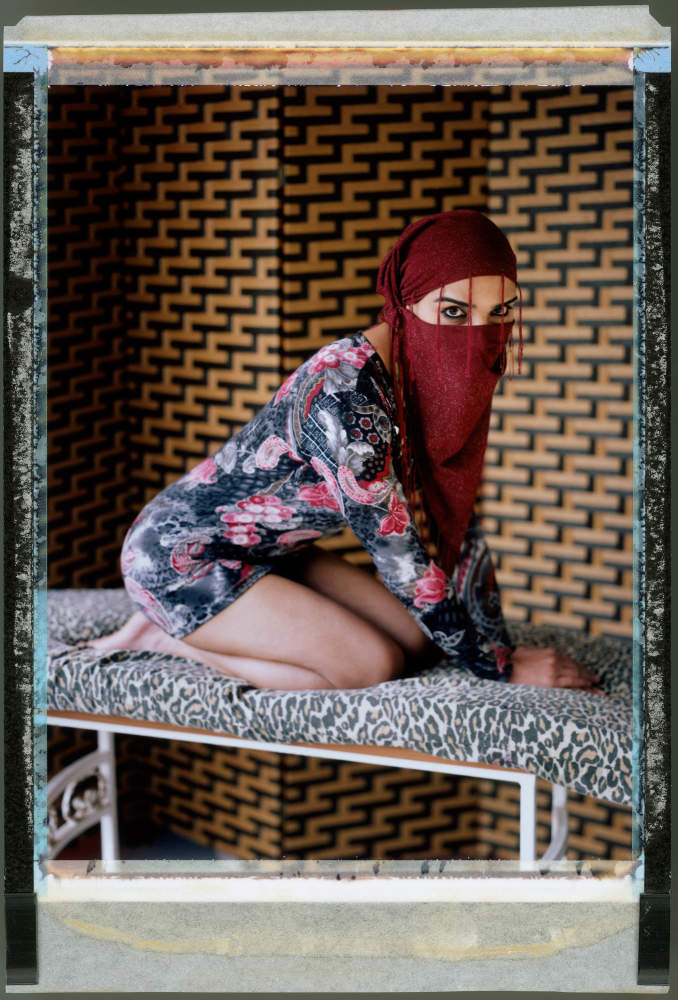
Jessy
AJessy, a 24 year old transgender woman born in a Palestinian refugee camp in Lebanon to Palestinian parents. “All my life, all of society have treated me in an inhuman way. It got worse as I got older especially at work and in university…. When I was small my parents saw me playing with a Barbie doll with a girl. They beat me. There are taboos – boys shouldn’t play with girls. My father said I was like a donkey, a dog. ‘You’re a disgrace'” he said. Jessie knew she was a girl though.
“When I was 6 or 7 years old, when my family was away, I used to sit in front of the mirror and put make up on like my mum. Sometimes my family caught me – they would insult me and beat me.” From a young age she was the victim of sexual abuse. “My uncle raped me when I was 11 and told me not to tell anyone about this. He raped me three times. I felt destroyed. He was stronger and forced me to do this against my will. I got depressed. It lasted for a long time. It was a very horrible period of my life. He used to tell me it was normal and give me money and told me not to tell anyone. I used to scream and tell him to go away. I couldn’t tell anyone about it because no one would believe me because he was this religious person.”
Her immediate family did not accept her at all. “My brother has always been ashamed of me. He still is. Many times through my life he beat me and insulted me. Five or six times, with the support of my father, he tried to kill me. My brother tried to stab me but he never was able to. Several times he beat me with a thick piece of wood. Once my father tried to strangle me but I managed to escape and run away.”
“I used to go to school with bruises on my face. Teachers would ask me what had happened. I would cry and not say anything. I was afraid.” Students at the school would make fun of her, insulting her with offensive terms for females. They would spit at her too. Sexual abuse happened in the school as well. “There was a boy in the school, he was 18, he raped me when I was 15. I was afraid to tell anyone about that. He threatened to tell my family about what happened.”
But it wasn’t just students who were cruel to her. She suffered discrimination throughout her schooling from her teachers as well. At her high school graduation the director of the school asked her to not attend. “She didn’t say why, but she didn’t have to.”
Jessie went to nursing school. She thought it would be the one profession that would accept her. She was wrong. “I had studied nursing for one year but when we were to start the internship, which we must do to graduate, my instructor told me ‘you should change yourself, and change your look if you want to do the internship’ I said ‘I can’t change myself. My behaviour and my look is not related to my knowledge and my education.’ She then called my parents and told them that they need to change me, and that I should go through spiritual therapy and I cannot do the internship because my look and my style would damage the reputation of the university.”
Without the internship Jessie could not qualify as a nurse. “I was very down when I realised I would not be able to be a nurse, I got depressed. But then I thought, ‘No, I’m not going to give up, I’m going to show her that I will be successful. I will graduate and find a job to show that there are people who can accept me – not like her.” “I’ve been looking for a job for five years, but when they see me for the interview, they often cancel it. Once when I went to apply for a job at a hospital, there was a big group of people handing in their CVs. They took everyone’s, but refused to take mine. At another hospital I went for an interview, they said to me ‘You’re coming to apply here? We can’t receive people like you here! We don’t even know your gender!’ I turned around and left. I felt so humiliated and oppressed.” Jessie has been taking hormones for the last year.’
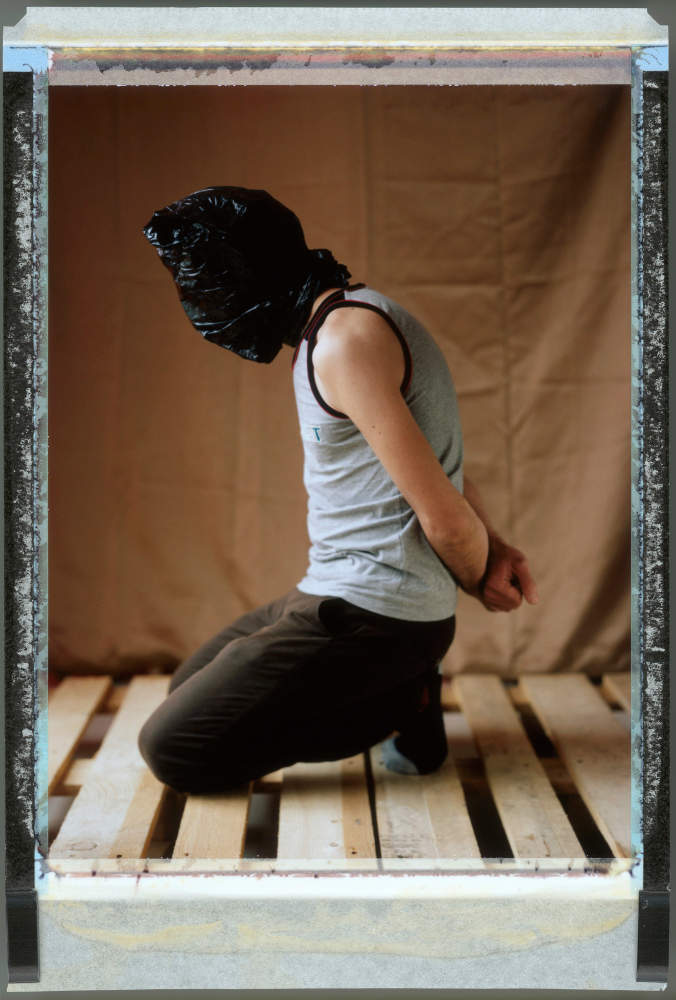
Gad
33 year old Gad [not his real name] from Homs. Gad arrived in Lebanon in July 2014. “I left Homs because my neighbourhood was under attack, it was bombed many times. I moved to Lebanon to try to find a job. I found work at the hammam giving massages”. Hammams are known as places where gay men go for sex. “I was obliged to work like this so I can assist my parents in Syria. It also provided me a place to stay and not pay rent. I used to work for two months, go back to Homs for a short time, then come back again.”
“One evening in August 2014 we were raided by the police.” A policeman came in undercover, asking for a ‘massage extra’, meaning sex. The receptionist refused but 20 soldiers and police entered. “They took all those who worked in the massage rooms, and started beating those of us from Syria. Everyone inside, staff and clients, were arrested, 27 of us, and taken to the Hbeish, the morality police. 11 of them were Syrian, the rest Lebanese. They punched and kicked me. They put a black cloth bag over my head. They continued to punch and kick me. I would never know where it was coming from. They were doing the same to the others. Sometimes we were alone in a room, sometimes there were two or three of us. We could hear each other being tortured. This went on for three days. They would beat us with water hoses.”
Gad was interrogated over the three days. The policemen demanded to know about the operation of the Hammam. They tried to get him to ‘out’ others working with him. “They beat me a lot. If they asked a question and it wasn’t what they wanted to hear they would start beating me again. I refused to give names.’ Gad says that once you say what they want they will make you sign confession and document that implicate others. At night, though the questions stopped, the torture continued. Gad feels it was just a form of cruel entertainment for the policemen. Two of the police used to taunt him in conversation with each other. “They would say things like ‘he has big lips, he must suck in the Hammam’ and ‘do you think he fucks or gets fucked?'” He could hear screaming from the other rooms. He thinks they made you listen to make you feel more afraid.
One policeman, while beating him, said to Gad: “My brother died in Syria, so I will take revenge on you.” After three days, the eleven Syrians, four Lebanese and one Iraqi were taken to Zahle Prison. On arrival the police from the morality police said to the prison guards of Zahle “we’ve brought the gays for you!” Then the Zahle prison guards announced to the prisoners “We got you the rabbits!” meaning those that have lots of sex, as a gift. As Gad and the other new inmates walked down the hallway of the prison they were beaten by over 70 inmates.
As Gad walked down the hallway two men took him aside, to another level of the prison and into a cell where he was beaten. Then one of them took him to the bathroom, beat him and forced him to suck his penis. Once he was finished he sent him to the other guy. After that one was finished a third came in and tried to sodomise him. At this point Gad started to cry and begged him to stop “I’ll kiss your hand, God bless your parents, please stop.” The other inmate angrily replied “I’m horny and I want to come” He beat Gad and then forced him to suck his penis. Gad cried all the time while in prison.
The ‘boss’ of his cell demanded two hundred US dollars a week to keep Gad safe. One of his old clients paid. After four days in prison a humanitarian organisation provided them with lawyers. After 28 days they were released. In March 2015 they will appear in court charged with ‘Homosexuality’ under article 534 of the Lebanese Penal Code which prohibits having sexual relations that ‘contradict the laws of nature’ and is punishable by up to a year in prison. “There are a lot of things that I can’t forget, like the raping in the jail.”
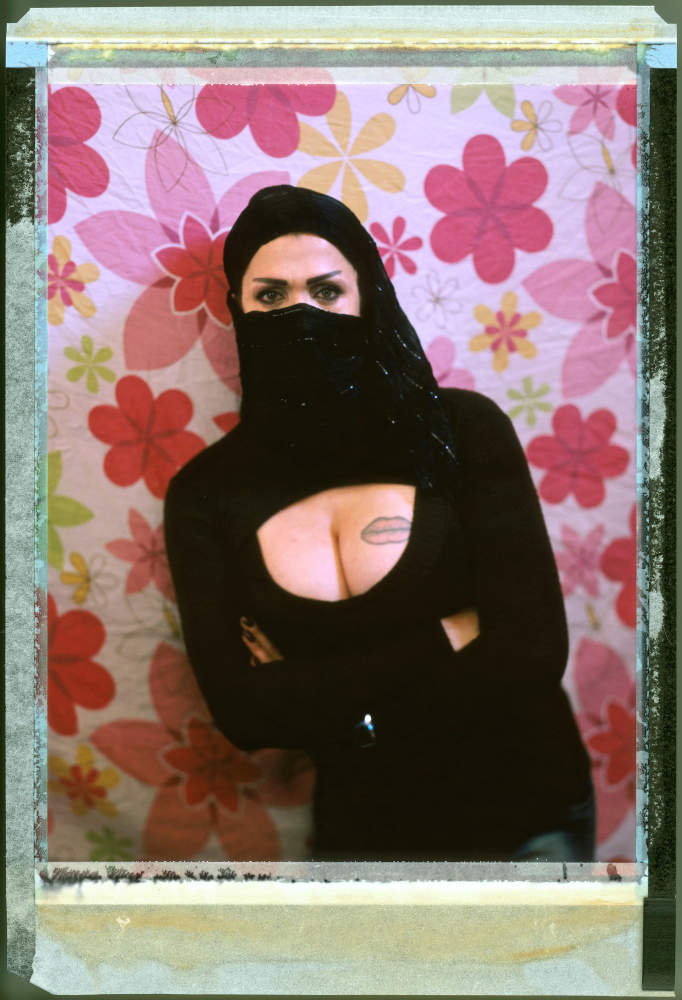
Shirine
Shirine, 45, from Aleppo. She describes herself as a woman who used to be a man. The first time she was arrested was in 1993. “The police came to my house to take me. Someone told them I was gay. A friend of mine, who they had arrested.” She has been arrested four times in total in Aleppo while it was under control of the Assad Regime for ‘homosexuality’, spending a few months in jail each time: four months, nine months, four months, six months. The last time she was arrested was in 1999.
Humiliation by soldiers in the prison was common. During the second arrest she was raped. She was being beaten in prison with an electric cable by her torturer who said “How do you suck a dick?” He took it out and said “show me how you do it? This is your salvation – you will be under my protection, no one will touch you.” “Because of these arrests, my family rejected me totally. After a time, I got tired of the judgments, so I decided to come like this, to be a woman…. I avoided the judgment of society this way.”
In September 2005 she had reassignment surgery in Syria. After the death of her father she started receiving threats from her brother. She found out that he wanted her dead. She comes from a very conservative family, she says. She has faced discrimination because of her identity most of her life. This escalated considerably when The Free Syrian Army took over her neighbourhood in Aleppo. “The first thing they (the Free Syrian Army) said when they took over the area is that they would destroy the house of Shirine.”
Shirine’s boyfriend was Christian, she is Muslim and transgender. “They considered it the house of sin. They made me cover my hair before they would come in the house. They then checked the house. They told me that if I stayed they would not be responsible for my safety. I knew that meant that if I was to stay they will turn me into a Shawarma – they will rape me and discover who I am, then they will kill me. If I wanted to die, I would have stayed there. I left the house, I took my papers, collected my dog (because they would have killed my dog – it is Haram – the dog is my daughter), and left that night’. Shirine escaped Syria in a hijab and now lives in Beirut. “I’m both threatened by the terrorists and my family. They want me killed.”
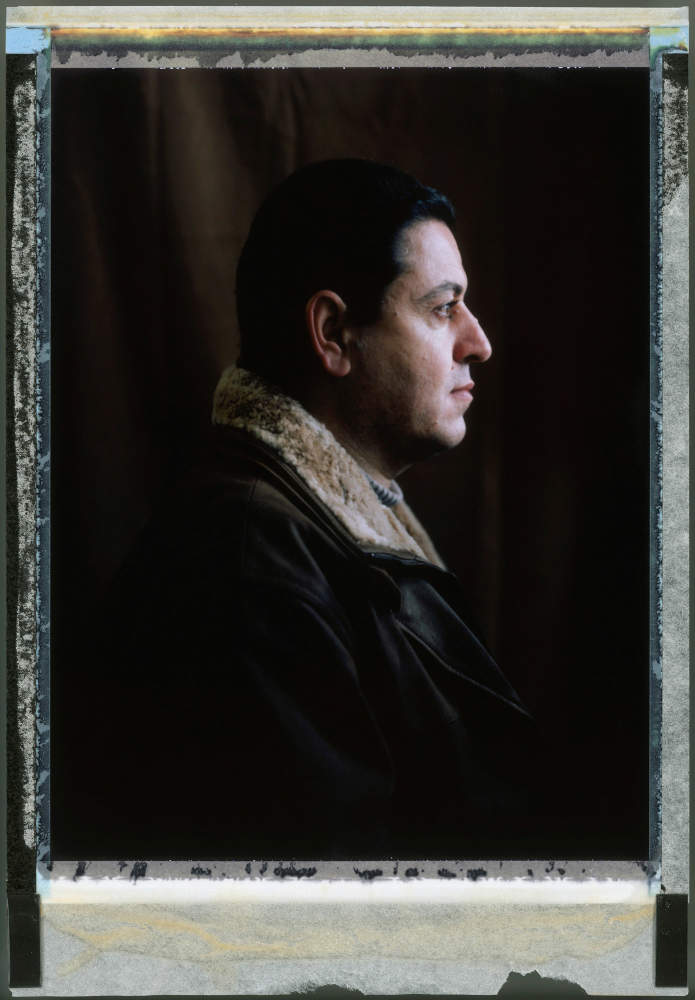
Khalaf Yousef Ibrahim Abu Khalaf
Khalaf Yousef Ibrahim Abu Khalaf, 40, from Amman, Jordan. He is a gay man who has been living in Beirut. “I came here escaping my family. After I came out, my older brother came to my house with three of my other brothers. He showed me a gun and said ‘you destroyed the honour of our family, be prepared to die’. They beat me – they kicked and punched me, I lost a lot of blood from my nose.”
His brothers went to his parents’ house and started talking about how they planned to kill Khalaf. Their plans were overheard by Khalaf’s wife and mother who were next door. His wife came upstairs, pale and sobbing: “Your brothers want to kill you – wait until they have left, take your passport and papers and leave!”
“I was really afraid. I thought my family would have a bad reaction, but not to kill me!” Khalaf’s wife knew he was gay, he had told her five months previously. But he came out publicly in April 2014. “I came out on a channel on YouTube. It was an interview with an Egyptian guy. They interviewed me and uploaded it on GooglePlus. All my family and everyone who knows me saw the interview. For the first time I accepted myself, for the first time in my life the real Khalaf was talking to the world. Before I had two faces, the secret one, and the one I used everyday. When I was 30 I told a Sheikh (Imam) about my sexuality, and he advised me to get married – that this is the devil doing this stuff – so I got married… I thought I was alone. I used to have these feelings for men but I thought I was the only one. I had no idea that there were other people who had the same feelings. I had no idea about even the name of this thing.”
“My wife knew I was gay, but she still loved me, even now we are divorced she still loves me. The worst part of the story is I feel I was unfair to her.” Khalaf flew to Beirut from Amman. Since arriving, he’s been out of work and living in poverty. He’s been surviving off donations from friends. “Life is difficult here, I have lost my family but I have no regrets. I feel free from the oppression.”
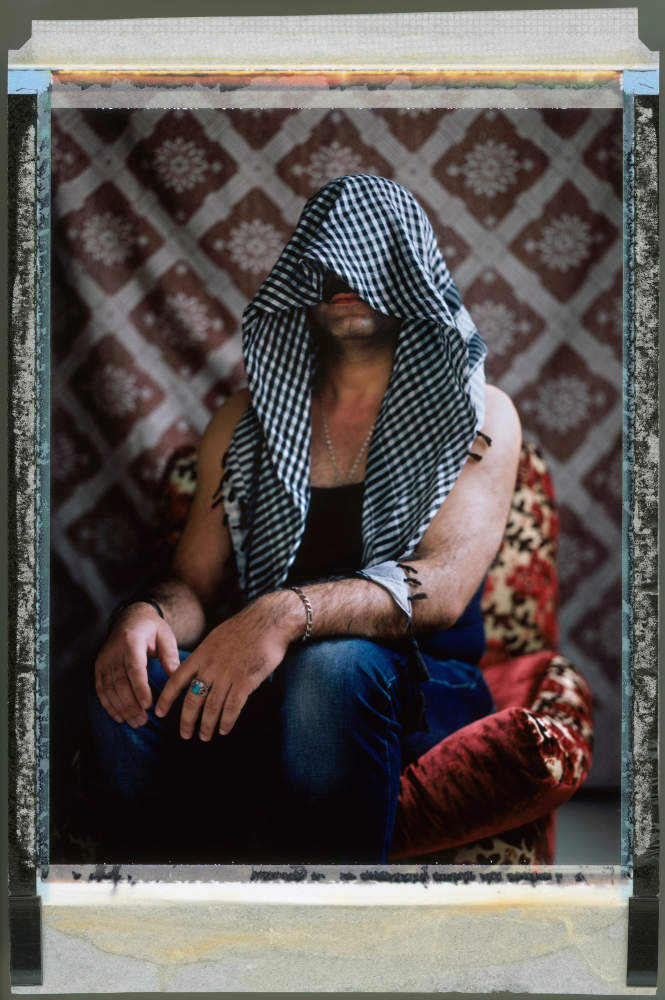
Khalid
36 year old Khalid is a gay man from Baghdad. “I left Iraq because no one accepted me as Gay. I left because I suffered from the bad treatment from the normal people. I was insulted by many people at work, at home, in the neighbourhood, in the street. They treated me like a girl, they would say things like ‘you are a beautiful girl, come with us’ even though I never wore anything feminine or revealed my sexuality. I used to hear this stuff all the time.”
The constant insults, gossiping and rejection by society “made me loose focus on everything including my work. I felt very sad and humiliated. I used to go to the bathroom and cry. I was a rejected person – I was like a white robe amongst millions of black robes.” Khalid did, on occasion, find someone who shared his secret. “In 2013 I was in a relationship. We’d been together for a year. We were in love. One day my boyfriend’s older brother found us in bed together. He beat us badly. Then he went and told my family. The two families found out and rejected us. My family started to push me away. My older brother went to the leader of our tribe to find the right punishment for me. I don’t know what the leader of the tribe said, but we all know the punishment for being gay is death. My father used to ask my older brother ‘when are you going to see the boss of our tribe and see about the punishment?'”
“In Iraq it is normal to kill a gay family member as it is a crime against the family’s honour. I was really afraid for my life. So one morning I went to work and didn’t come back home. I asked to be referred to another building that was in the Green Zone, that way no one can come in to kill me.” Khalid tragically learnt how real the threat towards anyone identified as gay is. “I had a gay friend who was feminine, he was a hairdresser. I had a small apartment. He asked if he could stay there. I went back (to the apartment) and found a lot of people at the entrance and even a couple of police cars in front of the apartment. I asked some teenagers what was happening here, they said they found the owner of the place slaughtered ‘His head chopped off’. I lost the feeling of time and place. I couldn’t feel my legs and continued walking. I started thinking ‘what should I do now?’ I went to find a place to stay for the night. I went to the red light district of Baghdad. It is full of old, dirty buildings. I rented a small room. The landlord was a huge guy who was often drinking.”
“One afternoon, in the second week of my stay, he came into my room drunk. He grabbed me, I tried to beat him off but he punched me once in the stomach and it was enough! He forced me to the floor and raped me.” Khalid moved into the Green Zone. He was safe from his family, but the persecution did not end there. He started receiving death threats from a colleague at work who belonged to an extreme religious sect. Khalid was afraid as that sect had started attacking and killing gays in Baghdad.
It turned out that that colleague wanted to have sex with Khalid. One night in the work dormitory he propositioned Khalid. When Khalid refused, he pulled out a gun and ordered Khalid to take his clothes off and raped him. “After that I couldn’t look into the eyes of anyone at work. I was afraid they would look into my eyes and see I was raped…. Before this happened I already had many reasons to leave, but even more so after the rape.” Khalid started a relationship with a doctor. He moved in with him and away from the dangers of his workplace. The doctor used to invite men to his place for sex. One night he brought friends around. Khalid went to his room. Soon the three men came into his room and raped him. “They were beasts.” He didn’t go back to the doctor’s place.
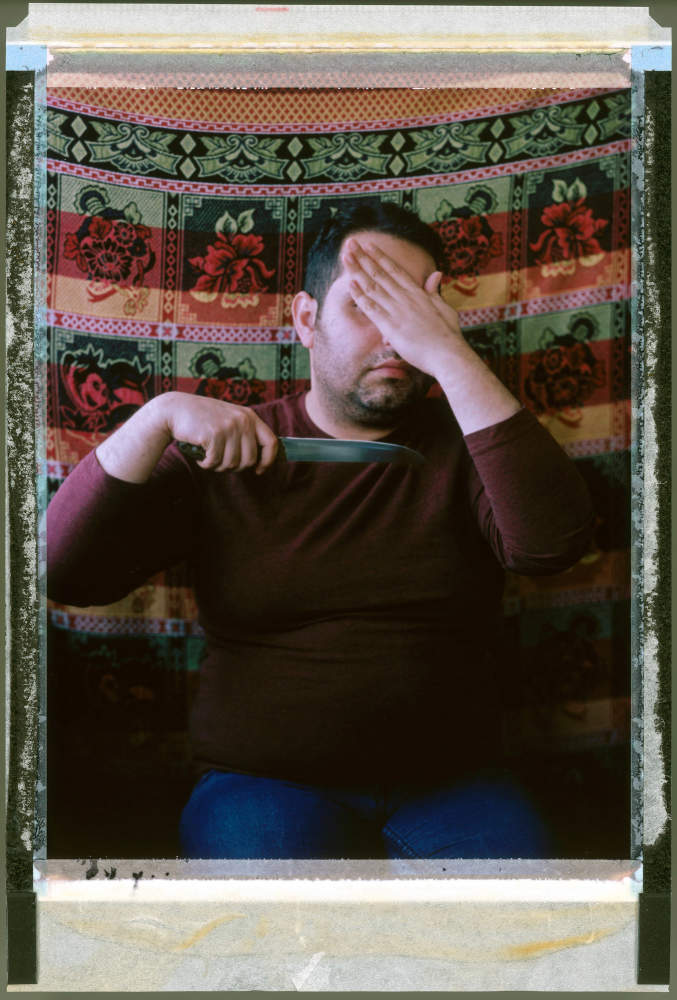
'M'
33 year old ‘M’ [name withheld], a medical professional from Syria. “The Free Syrian Army entered my area, there was disorder everywhere. There were no police, nothing at all, and the Free Army was powerful and able to do anything, there was no law. It was clear that sooner or later danger would reveal itself to the LGBT community. It really began when Jabhat Al Nusra kidnapped some gays in our area. First they kidnapped some of their friends – they got their photos from their phones and they started to hunt them. They arranged a plan to kidnap me with a guy who pretended he was gay and wanted to get acquainted with me. At first we went on a date then we decided to go to his friend’s place. They arranged to kidnap me from the street. It was a trap. At first they threatened to cut my head off or shoot me – they would place the knife on my neck and say to me ‘are you ready to die?’. They did the same with a gun. I suggested they bargain with my family. I was held for two weeks. My family paid about USD 13,000 to set me free. Sometimes I was afraid but I had the belief it was just for money. I knew I was in serious trouble, but I refused to panic.”
“After I was set free, my family advised me to live in my village around my tribe. But I went to work and led my usual life. Once I went back to my house. The house guard was shivering. He said ‘why are you here? ISIS are looking for you!’ ISIS had taken my documents. I called my uncle who contacted them. ISIS told him ‘We need him. He is a homosexual and must be killed. He is a fugitive. It is not allowed in this state.’ My uncle made an arrangement to let me escape – I had two hours to get out. I left with only the clothes I was wearing to a city under the control of the Syrian regime, then to Damascus, then to Beirut.”
“The news got around my relatives and around ISIS that I am gay. My relatives wanted my head. When I came to Beirut I was registered with the UN and they decided I was qualified to get resettlement because I have double threats from my relatives and ISIS and people in the Lebanese community and the Lebanese law. I’ve been waiting for eight months. They have told me they are waiting for a country to resettle me. But the more we wait the more we are danger. Everyday is like a struggle. When the day ends it doesn’t mean your struggle ends. And if you survive the previous day it doesn’t mean you will survive the next day. I am still under threat here. There are members of my tribe and family in ISIS forces and they know my location, but they told me they will hunt me soon – even if ISIS was destroyed in Syria they will take their revenge on me because I destroyed the image of my family and my tribe so the fair punishment is to cut my head off. One of them told me.”
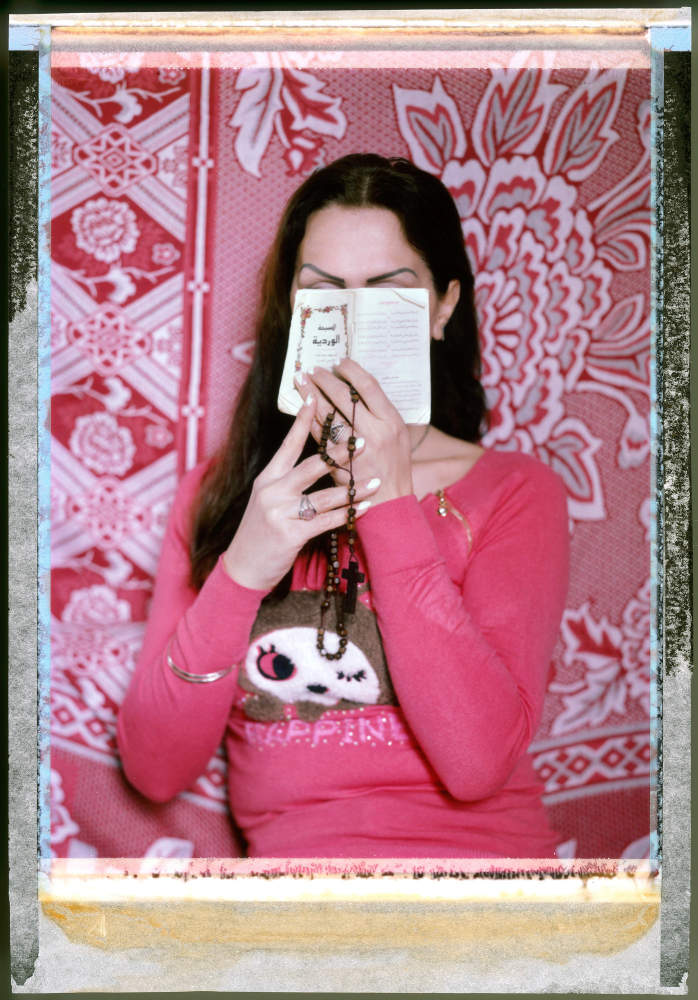
Nathalie
Nathalie [not her real name], 41, describes herself as a woman who used to be a man. “I’m very happy the way I am, I love myself as a girl. I hate people considering me a transsexual, I’m a full girl!” She is from Aleppo, Syria. She was effeminate as a young man which gave her great problems, especially when she entered her 2.5 years compulsory military service where this caused her regular discrimination and punishment. At the end of the service she was imprisoned and tortured in a military jail for nine months because they knew she was gay. She became deeply depressed and tried to commit suicide by jumping from the balcony of her apartment.
After the war began her house was destroyed in the bombing and in the chaos people turned on each other. “No one loved us as a family because of who I am” she says. People from the LGBT community started being targeted to a much greater extent. She was deeply affected by the murder of her gay friend. “I knew a gay guy that they caught. They slaughtered him and placed him in the garbage. When I heard his story, this guy was so nice to me, this incident affected me so much. He was my friend. If they could kill him then we could see everyone would be a target. They (The Free Syrian Army) even said on TV they would kill us (LGBT community).”
She and her family decided to leave the country due to the bombing and the danger Nathalie felt she was in. “If I was living one percent at ease in Syria, I wouldn’t have come here” she says. Her mother has always accepted her for who she is. “My mum is my life, she suffered with me so much. She is like my soul.”
Nathalie now lives in Beirut with her mum and her sister hoping to be resettled. “I want someone to hold me, I want a hand on the heart and a country that offers me security. That’s what my mum has been to me. I couldn’t leave my mum and come alone. I hope this message will reach someone. I will die before I go back to Syria’ she says.
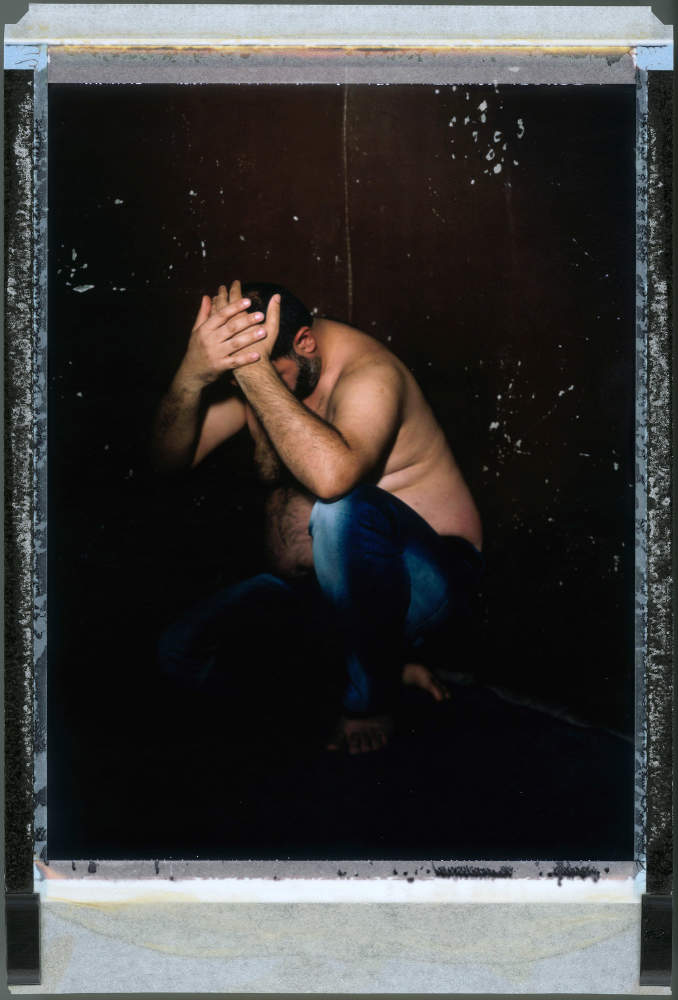
Ratib
Ratib [not his real name], 42, is a gay man from Damascus. “I got married on 7 December 2007, and was divorced on 8 August 2008. My wife was still a virgin. That made a lot of problems. My Aunt told me that my brother-in-law wanted to kill me – he was with the Free Syrian Army, and now he’s with the Jabhat Al Nusra. Most of the time they would get a reward when they got someone to kill.”
Ratib’s sister tried to mediate, to calm things down, instead the threats were confirmed by the brother-in-law. “If I see him I will kill him” he said. His brother-in-law was using the power he got from the Free Syrian Army to make the threats. Ratib had a bakery with his boyfriend 20 minutes outside Damascus. The area was divided between the regime and The Free Syrian Army. “My bakery was in the regime area, so I thought it would mean I am protected from my brother-in-law and from The Free Syrian Army.”
But while seven check points protected Ratib from The Free Syrian Army and his brother-in-law, he was not safe from the regime. In October 2014, late one evening, Ratib was relaxing in a garden in the centre of Damascus with his boyfriend. “We used to go there so no one would see us, so we wouldn’t be in trouble. It was around ten at night. We were waiting for my friend. I lay my head on the shoulder of my boyfriend. I saw two people coming towards me. They asked ‘How are you?’ I raised my head and saw they were police, they asked to see my ID, which is normal. After 30 minutes they returned and asked me to come with them, they held my hands behind my back and took me to the car. They put me in the boot of the car. I called my lawyer friend from the boot of the car, he was at the station when I arrived.
My lawyer friend said to me “You should bare all that they do to you – don’t say anything – if they beat you or insult you don’t say anything.” They took me underground to a very small room. All of the police from the station came down to beat me. They used their hands, their feet, cables, sticks – from 11 to 6 in the morning. I was bruised all over my body. I was always trying to hide my genitals and face, they don’t look where they beat you, the just beat. They were wearing heavy army boots so you must cover your face. They didn’t ask me anything. They beat me because I am gay. I felt very humiliated. I was scared of course, but every time someone beat me I would say to myself, ‘this is the last one, this is the last one'”
At 9 they took me to court. I stayed there until 2 when I was released. My lawyer had paid everyone in the station and court to change the sentence from gay sex in the street to insulting my wife in the street. He paid a lot of money to do this.” On release he told his boyfriend, “this is a sign for us to leave.” His family was after him, and now he was being targeted by the regime too. “I became afraid to go into the street.”
He started selling his materials in the bakery until he got his passport. Then he left. He came to Lebanon on 17 December 2013. Even in Lebanon though he doesn’t feel safe. At the end of 2014 Ratib received a message from his sister telling him to be careful, his brother-in-law is coming to find him. His sister said “Your brother-in-law is coming to Lebanon to find a job.” Ratib asked “Is he coming to Lebanon to find a job or something else?” she replied “you are the job.” Talking about LGBT issues in the region he says “In the near future – you can’t have any positive thoughts about LGBT issues in this region. From inside you can’t do anything. Maybe when the people are resettled we can make a change.”
